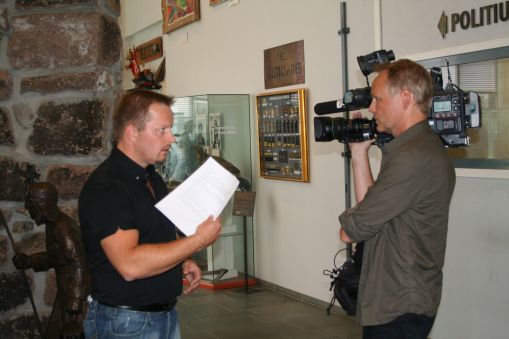Yesterday, the Association of Saharawis in Norway and the Norwegian Support Committee for Western Sahara (NSCWS) jointly reported the Norwegian fertilizer giant Yara to the police for breaking the Norwegian Penal Act’s paragraph 317, on dealing in stolen goods. Yara has imported 16.800 tons of phosphate from Western Sahara, occupied by Morocco. The state owned company has paid Moroccan authorities for the phosphate, knowing full well that, as an occupier, it does not belong to Morocco, but is instead to be considered stolen goods. (30-AUG-08)
 Originating from the Norwegian Support Committee for Western Sahara, issued yesterday, this article has been translated, edited and prepared for publication here by HRH F / Niels Jacob Harbitz. Photos of Salem and Hansen: the Norwegian Support Committee for Western Sahara, photo of Daddach: Thomas Frantsvold.
Originating from the Norwegian Support Committee for Western Sahara, issued yesterday, this article has been translated, edited and prepared for publication here by HRH F / Niels Jacob Harbitz. Photos of Salem and Hansen: the Norwegian Support Committee for Western Sahara, photo of Daddach: Thomas Frantsvold.
 -Morocco commits severe atrocities against the Saharawi people. They steal our resources. Yara has knowingly bought something that does not belong to Morocco, but to us, the Saharawi people. Even so, they opted to accept this stolen goods. It is sad and unfair, says Sidahmed Salem, right, the leader of the Association of Saharawis in Norway.
-Morocco commits severe atrocities against the Saharawi people. They steal our resources. Yara has knowingly bought something that does not belong to Morocco, but to us, the Saharawi people. Even so, they opted to accept this stolen goods. It is sad and unfair, says Sidahmed Salem, right, the leader of the Association of Saharawis in Norway.
 -Yara’s deal contributes to finance and legitimize the Moroccan occupation and suppression. In our opinion, this is both criminal and unethical. We have previously demanded of Yara that the company apologises for the deal, guarantees that it will not happen again and compensates he Saharawis for the loss suffered. Considering the fact that Yara has now broken its own promises to stop such imports, and also acts directly against the strong discouragement of Norwegian authoritiesfrom trading with Moroccan authorities in goods originating from Western Sahara, it is our duty to report it, says Ronny Hansen, left, leader of the NSCWS.
-Yara’s deal contributes to finance and legitimize the Moroccan occupation and suppression. In our opinion, this is both criminal and unethical. We have previously demanded of Yara that the company apologises for the deal, guarantees that it will not happen again and compensates he Saharawis for the loss suffered. Considering the fact that Yara has now broken its own promises to stop such imports, and also acts directly against the strong discouragement of Norwegian authoritiesfrom trading with Moroccan authorities in goods originating from Western Sahara, it is our duty to report it, says Ronny Hansen, left, leader of the NSCWS.
 -Yara claims the shipment to be a ‘test cargo’. Even so, the company trades in stolen goods, and pays the occupier 40 million Norwegian kroner, approximately 8 million US dollars, for the phosphate. Yara has bought several such shiploads of phosphate from Morocco before, but following pressure, the company promised to stop all imports from Western Sahara in 2005. Now, Yaras reassurances can no longer be trusted. Such violations by a state owned company are unacceptable, says Hansen, right, pictured as he is being interviewed about the handover of the report on Yara’s illegal shipment to the Norwegian police.
-Yara claims the shipment to be a ‘test cargo’. Even so, the company trades in stolen goods, and pays the occupier 40 million Norwegian kroner, approximately 8 million US dollars, for the phosphate. Yara has bought several such shiploads of phosphate from Morocco before, but following pressure, the company promised to stop all imports from Western Sahara in 2005. Now, Yaras reassurances can no longer be trusted. Such violations by a state owned company are unacceptable, says Hansen, right, pictured as he is being interviewed about the handover of the report on Yara’s illegal shipment to the Norwegian police.
 Western Saharan authorities, Saharawi organisations in the occupied territories, and leading human rights activists, including the Rafto Human Rights Award laureate, Sidi Mohammed Daddach, right, have all repeatedly protested against international companies’ trading with Morocco, an occupier, in natural resources from Western Sahara.
Western Saharan authorities, Saharawi organisations in the occupied territories, and leading human rights activists, including the Rafto Human Rights Award laureate, Sidi Mohammed Daddach, right, have all repeatedly protested against international companies’ trading with Morocco, an occupier, in natural resources from Western Sahara.





